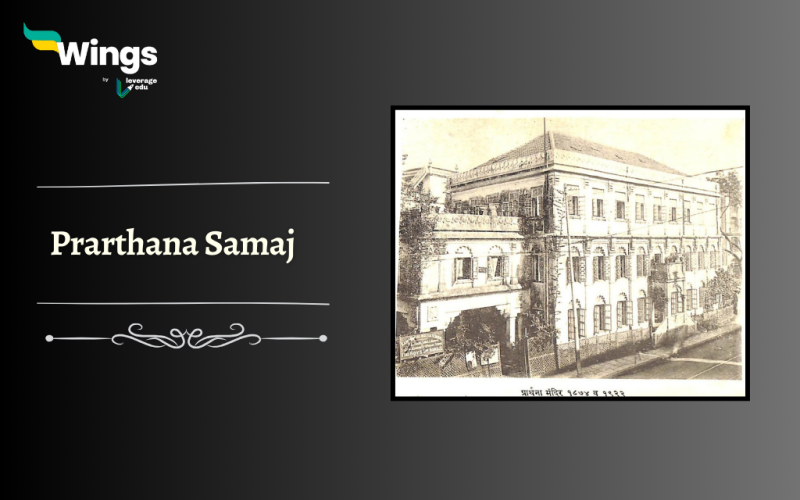Prarthana Samaj meaning “Prayer Society” in English was a reformist movement established in 19th century India. It aimed to challenge traditional social and religious practices that were prevalent at that time. It involved a blend of democratic and individualistic Western beliefs and the members were believers of theism. This article will delve into the history, founders and leaders along with the objectives and impact of Prarthana Samaj in Indian Society.
Table of Contents
History of Prarthana Samaj
Prarthana Samaj emerged in the mid-19th century in the city of Bombay (now known as Mumbai). The movement was founded by Atmaram Pandurang who was a social reformer and intellectual. Inspired by the ideas of the Brahmo Samaj which was a similar movement in Bengal, Atmaram Pandurang sought to address social and religious issues prevalent in Indian society. Though the approach of the Samaj was not as extreme as that of Brahmo Samaj, the Prarthana Samaj sought to bring reformist activism with caution.
In 1867, Pandurang was assisted by Keshab Chandra Sen in establishing the samaj. They supported monotheism, denounced priesthood and the prejudice of the caste system. It worked for social transformation by heavily setting precedents from educational backgrounds and not based on orthodoxical beliefs.
Also Read – Poona Sarvajanik Sabha: History, Founders, Objectives & Impact
Who was the Founder of Prarthana Samaj?
The founder of Prarthana Samaj was Atmaram Pandurang who was a visionary leader and dedicated his life to the betterment of Indian society. He was known for his intellect, deep religious knowledge and progressive ideas.
Other prominent leaders associated with the movement include Ramakrishna Gopal Bhandarkar, Mahadeo Govind Ranade, and Dadabhai Naoroji. M G Ranade brought a new sense of bright light into the samaj. He joined in the year 1870 and his efforts helped the Samaj gain popularity in the Indian subcontinent.
Also Read – Arya Samaj: History, Founder, Features, Significance
Principles and Objectives of Prarthana Samaj
Following the guidelines set by Sadharan Brahmo Samaj, they also worked for the betterment and inclusiveness of the teachings of great saints and poets in their worship. They were of the belief that God is the Supreme architect of the universe and to whomever a person worships, they are workshop the same God.
They had the objective of working for the depressed workers and labourers and also for their children. Some of their objectives are –
- Abolition of Caste System: Prarthana Samaj vehemently opposed the rigid caste system and considered it one of the biggest hurdles to social progress. The movement aimed to promote equality and unity among all castes and communities.
- Women’s Empowerment: Another significant objective of Prarthana Samaj was to uplift the status of women in Indian society. The movement advocated for women’s education, equal rights, and an end to discriminatory practices like child marriage and dowry.
- Promotion of Education: Prarthana Samaj played a significant role in promoting the importance of education, especially for the marginalized sections of society. It established schools and colleges that provided quality education to both boys and girls, irrespective of their caste or creed and brought in gender equality.
- Religious Reforms: The movement aimed to encourage religious tolerance and discourage blind superstitions. Prarthana Samaj advocated for worship based on rationality and devotion rather than ritualistic practices.
- Establishment of Orphanages – They opened homes for orphans and widows, supported widow remarriage and established various schools for the kids of the working class.

Impact of Prarthana Samaj
Prarthana Samaj though worked secretly, but had a great impact on Indian society. Some of the impacts that were seen are –
- Social Reforms: The movement’s relentless efforts to abolish the caste system encouraged inter-caste marriages and promoted social harmony. Prarthana Samaj played a significant role in eradicating social evils like untouchability and promoting equality and brotherhood among all individuals.
- Women’s Rights: Prarthana Samaj contributed to the empowerment of women by advocating for their education and equal rights. The movement challenged traditional gender roles and supported women’s participation in social and political spheres.
- Education: The establishment of schools and colleges by Prarthana Samaj paved the way for accessible education for all irrespective of caste or gender. They imparted Western education which helped in generating democratic values.
Prarthana Samaj’s emphasis on rationality and devotion helped in reforming religious practices. The movement encouraged followers to focus on the essence of religion rather than blindly following rituals which led to a more enlightened and inclusive approach. With its focus on social equality, women’s empowerment, education, and religious reform, the movement had a lasting impact on various aspects of Indian life. Prarthana Samaj’s contributions continue to inspire modern-day social reformers and serve as a reminder of the power of progressive thought and action.
Relevant Blogs
| Pandit Motilal Nehru | Ishwar Chandra Vidyasagar |
| Indira Gandhi | Dayanand Saraswati |
| The Government of India Act 1919 | Kiran Bedi |
| Henry Vivian Derozio | Surat Split |
| Bengal Partition | Birsa Munda |
We hope you liked our blog on Prarthana Samaj. If you want to read more articles like this you can visit our general knowledge page on Indian History!
 One app for all your study abroad needs
One app for all your study abroad needs













